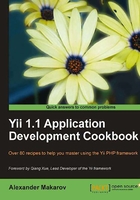
Using regular expressions in URL rules
One of the "hidden" features of Yii URL router is that you can use regular expressions that are pretty powerful when it comes to strings handling.
Getting ready
- Create a fresh Yii application using
yiic webappas described in the official guide and find yourprotected/config/main.php. It should contain the following:// application components 'components'=>array( … // uncomment the following to enable URLs in path-format /* 'urlManager'=>array( 'urlFormat'=>'path', 'rules'=>array( '<controller:\w+>/<id:\d+>'=>'<controller>/view', '<controller:\w+>/<action:\w+>/<id:\d+>'=>'<controller>/<action>', '<controller:\w+>/<action:\w+>'=>'<controller>/<action>', ), ), - Delete everything from rules as we are going to start from scratch.
- In your
protected/controllers, createPostController.phpwith the following code inside:class PostController extends CController { public function actionView($alias) { echo "Showing post with alias $alias."; } public function actionIndex($order = 'DESC') { echo "Showing posts ordered $order."; } public function actionHello($name) { echo "Hello, $name!"; } }This is our application controller we are going to access using our custom URLs.
- Configure your application server to use clean URLs. If you are using Apache with
mod_rewriteandAllowOverrideturned on, then you should add the following lines to the.htaccessfile under yourwebrootfolder:Options +FollowSymLinks IndexIgnore */* RewriteEngine on # if a directory or a file exists, use it directly RewriteCond %{REQUEST_FILENAME} !-f RewriteCond %{REQUEST_FILENAME} !-d # otherwise forward it to index.php RewriteRule . index.php
How to do it...
We want our PostController actions to accept parameters according to some rules and give "404 not found" HTTP response for all parameters that do not match. In addition, post index should have an alias URL archive.
Let's use regular expressions to achieve it:
'post/<alias:[-a-z]+>' => 'post/view', '(posts|archive)' => 'post/index', '(posts|archive)/<order:(DESC|ASC)>' => 'post/index', 'sayhello/<name>' => 'post/hello',
Now, you can try the following URLs:
// success
http://example.com/post/test-post
// fail
http://example.com/post/another_post
// success
http://example.com/posts
// success
http://example.com/archive
// fail
http://example.com/archive/test
// success
http://example.com/posts/ASC
// success
The following screenshot shows that the URL http://example.com/post/test-post has run successfully:

The following screenshot shows that the URL http://example.com/archive/test did not run successfully and encountered an error:

How it works...
You can use regular expressions in both parameter definition and the rest of the rule. Let's read our rules one by one.
'post/<alias:[-a-z]+>' => 'post/view',
Alias parameter should contain one or more English letter or a dash. No other symbols are allowed.
'(posts|archive)' => 'post/index',
Both posts and archive are leading to post/index.
'(posts|archive)/<order:(DESC|ASC)>' => 'post/index',
Both posts and archive are leading to post/index. Order parameter can only accept two values: DESC and ASC.
'sayhello/<name>' => 'post/hello',
You should specify the name part but there are no restrictions on what characters are allowed.
Note that regardless of the rule used, the developer should never assume that input data is safe.
There's more...
To learn more about regular expressions, you can use the following sources:
- http://www.php.net/manual/en/reference.pcre.pattern.syntax.php
- Mastering Regular Expressions, by Jeffrey Friedl (http://regex.info/)
See also
- The recipe named Configuring URL rules in this chapter
- The recipe named Creating URL rules for static pages in this chapter